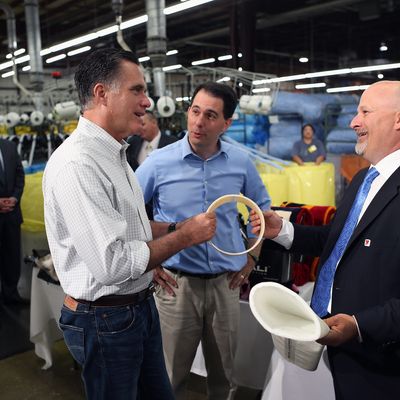
Republicans have spent the last four years baselessly accusing President Obama of stirring up resentment against the rich. Meanwhile, his campaign — or, at least, its surrogates — actually is stirring up resentment against a different group: foreign countries. Obama’s attacks on Romney for outsourcing have, in the latest ad from the pro-Obama super-PAC Priorities USA, metastasized into a general attack on overseas employment:
The ad says of China, “thousands owe their jobs to Mitt Romney’s companies,” illustrating the charge with video of Chinese workers on an assembly line. It then adds, “India — which also gained jobs thanks to Romney, an outsourcing pioneer!”
Why is Obama’s super-PAC running ads crediting Romney with creating jobs for people in China and India? And why is that considered such a terrible thing? Here is where the demographic weak point of Obama’s coalition runs squarely up against the beliefs of his economic advisers, and this somewhat unseemly political message is the result.
Obama is harnessing the political power of economic nationalism — the belief that other countries’ prosperity must come at our own expense. It’s an idea that economists consider almost totally wrong. I say “almost” because there is some legitimate disagreement over the possibility that a country can dominate an industry in a way that gives it an advantage over others — say, the cluster of software expertise around Silicon Valley. In general, though, economic nationalism is an idea that politicians use to win elections, then ignore when they’re in office. Obama does not want to stop outsourcing, offshoring, or free trade. He thinks that higher employment in China and India is, all things being equal, good.
But voters like economic nationalism. And there’s a certain category of voters that likes it an awful lot: working class voters, who have seen their wages stagnate over the last several decades in a more globalized environment. Obama has had trouble attracting white working-class voters, but not in a uniform way. In 2008, he cratered among white working-class voters in Appalachia, but held up fairly well among white working-class voters in the upper Midwest. (Probably because those voters had endured eight years of economic stagnation under George W. Bush.)
But now Obama is doing even worse among white working-class voters than he did four years ago. As Nate Cohn has convincingly argued, the decline in Obama’s support from 2008 has been highly uneven. He has held or even increased his standing among nonwhite voters, held up well among college-educated white women, and seen a little deterioration among college-educated white men. It’s white voters without a college degree where most of his decline has taken place.
This fact has important electoral college implications. In some states, especially those where Obama attracted new voters into the Democratic coalition, he relies mainly on nonwhite and college-educated white voters. That’s why he’s holding up reasonably well in Virginia and even North Carolina (the latter of which he just barely won in 2008). But for the same reason, it’s easy to see Obama losing disproportionate support in states where he needed lots of white voters with college degrees in order to win — mainly Michigan, Iowa, Wisconsin, and Minnesota.
Michigan is the hardest state to figure out right now. On the one hand, the high concentration of white working-class votes suggest it would be ripe to swing disproportionately back to the GOP. On the other hand, Michigan supported Obama by almost a seventeen point margin four years ago. Then Obama almost single-handedly rescued the state’s economy, while his opponent called for the industry to go bankrupt. So what gives? We still don’t know. Recent polls have shown, respectively, Romney leading by one point, Obama leading by six points, and Obama leading by fourteen points. Whether Michigan is in play is hard to say at this point.
What does seem clear is that Obama needs to hold down Romney’s margin among the white working class. The field of play has been generally narrowed to white working-class voters who disapprove of Obama’s job performance but also distrust Romney. NBC’s latest poll shows that undecided voters have a poor view of Obama, with a 29-42 favorable rating, but an abysmal view of Romney, at just 16 percent favorable against 44 percent unfavorable. Thus the general focus on discrediting Romney as a champion of the middle class, and the specific appeal to economic nationalism.






























